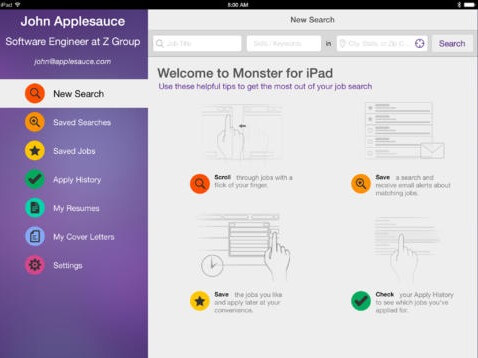During the job application process, you might end up applying for dozens of jobs. With so many opportunities – and months of wait time to hear back about positions – it’s only natural to get a little confused. The worst-case scenario: you get a call about a position you can’t exactly remember, you panic, and then you ask, “Which job is this for?”
Don’t let that happen to you. Keeping track of your applications is imperative, so track the jobs for which you’ve applied and your follow-up responses using these seven tips.
1. Write down a list of your contact information
For an efficient job search, it’s useful to make a list of contacts, your communications with these people, and the strength of your relationship. One place to get this information in order is on the online career management tool JibberJobber. There, you can track of every job application, as well as making lists of information about useful contacts in your application process.
2. Make lists of where you’ve applied
An Excel spreadsheet can help you stay organized in your job application process. Making tables of the company name, contact information, contact, position for which you applied, and date the application was submitted can save you time and energy in the long run.
3. List jobs to which you plan to apply
You don’t want to miss applying for a position you want because you missed the application due date. Plenty of career searching websites let you save positions for which you want to apply. The popular job searching website Monster even has a mobile app that lets you search and save positions on the go.

4. Keep a separate list of applications you haven’t finished yet
You also want to keep a list of applications you’re working on, but you haven’t yet finished. In your list, make sure you’ve noted the organization, the due date of the application, the materials you have finished, and the materials you have left to complete. If you work on applications across several computers, you might want to have this spreadsheet on the cloud, perhaps on the long-standing favorite, Google Drive.
5. Note which optimized version of your resume you sent where
Before you send out a resume, you want to make sure your keywords match those on the job posting. To do this, you can optimize your resume with Jobscan, which pulls keywords from job postings that you can use in your resume. Once you’ve sent out resumes, however, you want to make sure you know which resume versions you’ve sent to which companies. As you optimize your resume for each job posting, you can keep a list, likely in a folder in Microsoft Word, detailing which company you’ve sent each resume type to.
6. Make notes about timelines you’ve had with contacts
After you apply or after an interview, it’s important to be persistent with your potential employer. But you certainly don’t want to annoy your contact with too many communications. That’s why it’s so important to keep notes about your contact, probably in another column of the spreadsheet you made to keep track of each job application and interviews. Write down who you talked to and when, so you can follow up again in a timely fashion if you haven’t heard back from your contact in days.
7. Track conversations with contacts
It can be particularly useful to make notes about conversations you’ve had with contacts or hiring managers at an organization. Keep these notes in your spreadsheet log. Then, when you follow up in a timely and well-catalogued way with an email, you’ll also have notes about what you talked about with the hiring manager previously. If you mention why you’re writing – and note what the two of you talked about before – you’ll be on your way to crafting a memorable follow-up.
Whether your preferred method of tracking every job application is through an Excel spreadsheet, a mobile app, or both, it’s important to keep abreast of your materials. A failure to follow up after an application has been submitted or missing the deadline for an application could be the difference between landing a job or staying unemployed.

















